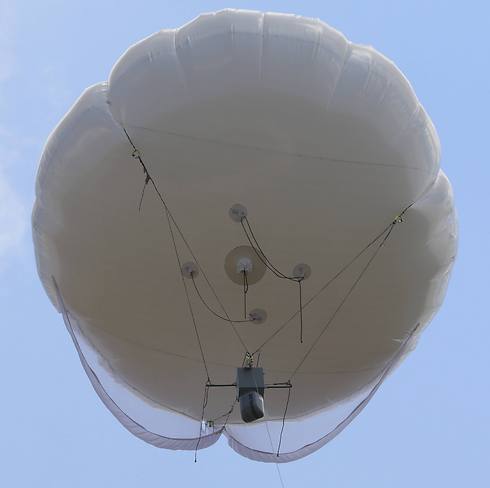Israeli police are watching from above in their attempts to keep control in Jerusalem in the face of the city's worst wave of violence in nearly a decade.
Police have been flying surveillance balloons over the city's eastern sector and Old City -- the location of its most sensitive holy sites -- to monitor protests and move in on them quickly. They say the puffy white balloons, which carry a rotating spherical camera pod, have greatly helped quell the unrest. But the eyes in the sky are unnerving Palestinians.
"They want to discover everything that's going on. (They see) who is going, who is coming, who is that person," said Imad Muna, who works at a local bookstore.
The Israeli company that makes the Skystar 180 aerostat system says the balloons can stay in the air for 72 hours and carry highly sensitive cameras.
Rami Shmueli, the CEO of RT LTA Systems Ltd, said his company gives police a "third dimension" in their quest to quell tensions in east Jerusalem, where they have been clashing regularly with masked youths hurling rocks and firebombs.
"We give them an aerial view of the streets and those people who are throwing stones, we can detect them even if they hide behind buildings or in gardens," said Shmueli. "When we see them and when we see their activity, we can direct the police forces to their location. And even if they escape we can follow them and make sure that police catch them."
Over the past month, 11 people have been killed in Palestinian attacks, including a deadly assault last week on a Jerusalem synagogue that killed five people. Most of the violence has occurred in Jerusalem, along with deadly attacks in Tel Aviv and the West Bank.
The violence has been connected in large part to continuing unrest at Jerusalem's most sensitive holy site – a hilltop compound revered by Jews as the Temple Mount and by Muslims as the Noble Sanctuary. The Temple Mount, home to the ancient Hebrew temples, is the most sacred site in Judaism. Today, it is the site of the Al Aqsa Mosque and the gold-topped Dome of the Rock, the third-holiest place in Islam.
Jews are allowed to visit the site, but under a longstanding arrangement, they are barred from praying there. A growing number of visits by Jewish worshippers – some of whom seek to pray or want to rebuild the Jewish Temple there – has sparked rumors that Israel is plotting to take over the site – a charge Israel denies – and prompted violent riots by Palestinian youths. Israeli crackdowns and restrictions on Muslim access to the site, imposed as a security measure, have further enflamed tensions.
The helium-filled balloons were successfully used in Israel's war in the Gaza Strip last summer. While various types of surveillance blimps have been used in the Jerusalem area for years, police spokesman Micky Rosenfeld said a strategic decision was recently made to increase their use as part of a broader effort to use the latest technologies.
He said police currently have four surveillance balloons deployed over Jerusalem, including one that monitors the Old City and its volatile holy sites, and others over Arab neighborhoods that have experienced unrest. Since the aerial deployment, he said there has been a marked decrease in street violence.
"It is tremendously important and gives us gives a 360-degree view of what is going on," Rosenfeld said. "Our units can respond a lot quicker, a lot faster and much more effectively."
The Skystar system is currently also deployed in Afghanistan, Mexico, Thailand, Canada, Russia, in various countries in Africa and was used for security at the World Cup in Brazil, the company says.
The balloons are part of a broad collection of surveillance equipment that includes security cameras throughout the city, including 320 of them in the Old City – as well as undercover units, riot-control forces and intelligence gathering.
Police have arrested some 1,000 protesters since the summer, when the violence erupted following the killing of a 16-year-old Palestinian boy by Jewish extremists in a revenge attack for the earlier killing of three Israeli teens in the West Bank.
Sheik Ikrima Sabri, the imam of the Al Aqsa Mosque, said Palestinians are well accustomed to the aerial surveillance of mass prayers each Friday. But he said the new surveillance over residential areas is a problem.
"It is practically over the houses. It violates the privacy of people. There are women in the houses and these machines can photograph them," he said.
Saleem Mohtaseb, a resident of Shuafat, an Arab neighborhood that has experienced frequent unrest, said the cameras have further frayed people's nerves. "I asked my wife to close the curtains whenever she sees it in the sky. I know many people who have done the same," he said.
מומלצים
















